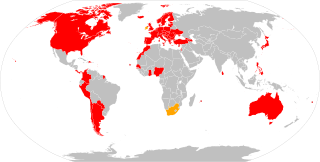Related Research Articles

Article Five of the United States Constitution describes the procedure for altering the Constitution. Under Article Five, the process to alter the Constitution consists of proposing an amendment or amendments, and subsequent ratification.

A World Heritage Site is a landmark or area with legal protection by an international convention administered by the United Nations Educational, Scientific and Cultural Organization (UNESCO). World Heritage Sites are designated by UNESCO for having cultural, historical, scientific or other forms of significance. The sites are judged to contain "cultural and natural heritage around the world considered to be of outstanding value to humanity".

The United States Anti-Doping Agency is a non-profit, non-governmental 501(c)(3) organization and the national anti-doping organization (NADO) for the United States. To protect clean competition and the integrity of sport and prevent doping in the United States with a performance-enhancing substance, the USADA provides education, leads scientific initiatives, conducts testing, and oversees the results management process. Headquartered in Colorado Springs, Colorado, USADA is a signatory to the World Anti-Doping Code, which harmonizes anti-doping practices around the world, and is widely considered the basis for the strongest and strictest anti-doping programs to prevent doping in sport.
The World Anti-Doping Agency is a foundation initiated by the International Olympic Committee based in Canada to promote, coordinate, and monitor the fight against drugs in sports. The agency's key activities include scientific research, education, development of anti-doping capacities, and monitoring of the World Anti-Doping Code, whose provisions are enforced by the UNESCO International Convention Against Doping in Sport. The aims of the Council of Europe Anti-Doping Convention and the United States Anti-Doping Agency are also closely aligned with those of WADA.

The Hague Convention for the Protection of Cultural Property in the Event of Armed Conflict is the first international treaty that focuses exclusively on the protection of cultural property in armed conflict. It was signed at The Hague, Netherlands, on 14 May 1954 and entered into force on 7 August 1956. As of July 2021, it has been ratified by 133 states.

The Convention on the Protection and Promotion of the Diversity of Cultural Expressions is an international treaty adopted in October 2005 in Paris during the 33rd session of the General Conference of the United Nations Educational, Scientific and Cultural Organization (UNESCO). In response to the fears that globalization would lead to an increasingly uniform global culture, it allows states to protect cultural diversity by promoting and defending their own cultural industries. It also establishes international co-operation to help protect the cultural industries of developing countries, including the creation of the International Fund for Cultural Diversity. It reaffirms many of the principles of the 2001 UNESCO Universal Declaration on Cultural Diversity but, unlike that declaration, it is legally binding and requires legal ratification by member states. The convention is the first international treaty to give cultural goods a special status, having cultural as well as economic value.

The Convention on Cybercrime, also known as the Budapest Convention on Cybercrime or the Budapest Convention, is the first international treaty seeking to address Internet and computer crime (cybercrime) by harmonizing national laws, improving investigative techniques, and increasing cooperation among nations. It was drawn up by the Council of Europe in Strasbourg, France, with the active participation of the Council of Europe's observer states Canada, Japan, the Philippines, South Africa and the United States.

The World Heritage Committee is a committee of the United Nations Educational, Scientific and Cultural Organization that selects the sites to be listed as UNESCO World Heritage Sites, including the World Heritage List and the List of World Heritage in Danger, defines the use of the World Heritage Fund and allocates financial assistance upon requests from States Parties. It comprises representatives from 21 state parties that are elected by the General Assembly of States Parties for a four-year term. These parties vote on decisions and proposals related to the World Heritage Convention and World Heritage List.

The Cape Town Convention on International Interests in Mobile Equipment, or Cape Town Treaty is an international treaty intended to standardize transactions involving movable property. The treaty creates international standards for registration of contracts of sale, security interests (liens), leases and conditional sales contracts, and various legal remedies for default in financing agreements, including repossession and the effect of particular states' bankruptcy laws.
The Convention on the Protection of the Underwater Cultural Heritage is a treaty that was adopted on 2 November 2001 by the General Conference of the United Nations Educational, Scientific and Cultural Organization (UNESCO). The convention is intended to protect "all traces of human existence having a cultural, historical or archaeological character" which have been under water for over 100 years. This extends to the protection of shipwrecks, sunken cities, prehistoric art work, treasures that may be looted, sacrificial and burial sites, and old ports that cover the oceans' floors. The preservation of underwater cultural heritage is significant as it allows for the retelling of numerous historical events. As part of its duty to conduct scientific research and provide continuous education on the importance of underwater cultural heritage, UNESCO strives to maintain these sites for the enjoyment of current and future generations. The convention may provide a customary framework to help raise awareness and seek to combat the illegal looting and pirating occurring in waters worldwide. As an international body, member states of the convention agree to work towards the preservation of sunken cultural property within their jurisdiction and the high seas.
The Validation or recognition of foreign studies and degrees is the process whereby a competent authority in one country formally recognises the value of a qualification from a foreign country. This can entail total or partial validation of foreign university and non-university studies, degrees and other qualifications. Particularly within Europe, this is covered by a number of international conventions and agreements.

The World Heritage Convention, formally the Convention Concerning the Protection of the World Cultural and Natural Heritage, is an international treaty signed on 23 November 1972, which created the World Heritage Sites, with the primary goals of nature conservation and the preservation of cultural properties. The convention, a signed document of international agreement, guides the work of the World Heritage Committee. It was developed over a seven-year period (1965–1972).

The Convention for the Safeguarding of the Intangible Cultural Heritage is a UNESCO treaty adopted by the UNESCO General Conference on 17 October 2003.

The UNESCO 1970 Convention on the Means of Prohibiting and Preventing the Illicit Import, Export and Transfer of Ownership of Cultural Property is an international treaty to combat the illegal trade in cultural items. It was signed on 14 November 1970 and came into effect on 24 April 1972. As of October 2022, 142 states have ratified the treaty.
The Canadian Commission for UNESCO (CCUNESCO), administered by the Canada Council for the Arts, is Canada's national commission for UNESCO, actively advancing the organization's mandate to contribute to peace based on the intellectual and moral solidarity of humankind by promoting cooperation among nations.

The Convention Relating to the Distribution of Programme-Carrying Signals Transmitted by Satellite was opened for signature on 21 May 1974 in Brussels and entered into force on 25 August 1979. It is overseen by the United Nations Committee on the Peaceful Uses of Outer Space.
The Hague Hijacking Convention is a multilateral treaty by which states agree to prohibit and punish aircraft hijacking. The convention does not apply to customs, law enforcement or military aircraft, thus it applies exclusively to civilian aircraft. The convention only addresses situations in which an aircraft takes off or lands in a place different from its country of registration. The convention sets out the principle of aut dedere aut judicare—that a party to the treaty must prosecute an aircraft hijacker if no other state requests his or her extradition for prosecution of the same crime.
The Convention for the Suppression of Unlawful Acts against the Safety of Civil Aviation is a multilateral treaty by which states agree to prohibit and punish behaviour which may threaten the safety of civil aviation.
The Russian Anti-Doping Agency, established in January 2008, is the Russian National Anti-Doping Organisation (NADO), affiliated with the World Anti-Doping Agency (WADA).